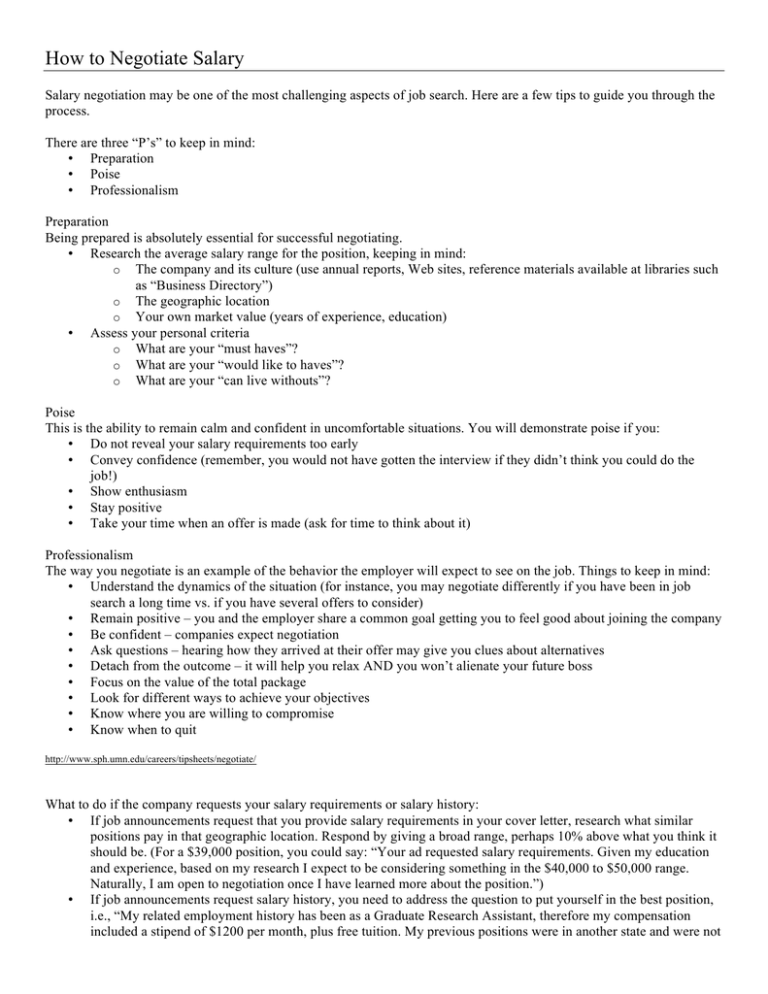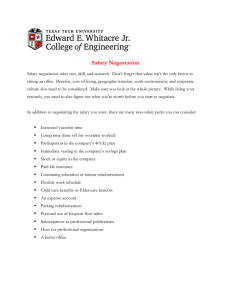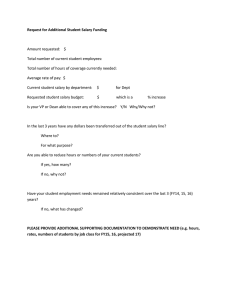How to Negotiate Salary
advertisement

How to Negotiate Salary Salary negotiation may be one of the most challenging aspects of job search. Here are a few tips to guide you through the process. There are three “P’s” to keep in mind: • Preparation • Poise • Professionalism Preparation Being prepared is absolutely essential for successful negotiating. • Research the average salary range for the position, keeping in mind: o The company and its culture (use annual reports, Web sites, reference materials available at libraries such as “Business Directory”) o The geographic location o Your own market value (years of experience, education) • Assess your personal criteria o What are your “must haves”? o What are your “would like to haves”? o What are your “can live withouts”? Poise This is the ability to remain calm and confident in uncomfortable situations. You will demonstrate poise if you: • Do not reveal your salary requirements too early • Convey confidence (remember, you would not have gotten the interview if they didn’t think you could do the job!) • Show enthusiasm • Stay positive • Take your time when an offer is made (ask for time to think about it) Professionalism The way you negotiate is an example of the behavior the employer will expect to see on the job. Things to keep in mind: • Understand the dynamics of the situation (for instance, you may negotiate differently if you have been in job search a long time vs. if you have several offers to consider) • Remain positive – you and the employer share a common goal getting you to feel good about joining the company • Be confident – companies expect negotiation • Ask questions – hearing how they arrived at their offer may give you clues about alternatives • Detach from the outcome – it will help you relax AND you won’t alienate your future boss • Focus on the value of the total package • Look for different ways to achieve your objectives • Know where you are willing to compromise • Know when to quit http://www.sph.umn.edu/careers/tipsheets/negotiate/ What to do if the company requests your salary requirements or salary history: • If job announcements request that you provide salary requirements in your cover letter, research what similar positions pay in that geographic location. Respond by giving a broad range, perhaps 10% above what you think it should be. (For a $39,000 position, you could say: “Your ad requested salary requirements. Given my education and experience, based on my research I expect to be considering something in the $40,000 to $50,000 range. Naturally, I am open to negotiation once I have learned more about the position.”) • If job announcements request salary history, you need to address the question to put yourself in the best position, i.e., “My related employment history has been as a Graduate Research Assistant, therefore my compensation included a stipend of $1200 per month, plus free tuition. My previous positions were in another state and were not directly related to this profession. From my research, I am expecting to consider a position paying in the range of $40,000 to $50,000 per year.” During the Interview Process • Do not be the first one to approach the salary issue. • Do not negotiate salaries until a job offer has been made. • If asked about salary issues before a job offer has been made, you may ask, “What is the range for this position?” • Try to avoid mentioning past salary history or information. Once the Job Offer Has Been Made • When a salary offer is initially given, respond by repeating the figure, then staying silent for about 15-30 seconds, as you think it over. • Remember that benefits are often also negotiable, and increased or customized benefits packages can be used to bring the overall value of employer salary offers into line with your salary goals. If you don’t anticipate using a specific benefit, ask for another in its place or monetary compensation. It may not be an option, but it doesn’t hurt to ask. (Generally, benefits cost the company 30%-40% in addition to your salary. This is called the total compensation package.) After the Negotiation When you think you have reached a satisfactory agreement: • Don’t accept a job, salary, or benefits offer at the table; ask for at least 24 hours to think it over, then respond. • Get job, salary, and benefits offers in writing before formally accepting. • If the employer doesn’t offer a formal offer letter, write your own. Include details about the job, start date, hours/schedule, salary, and benefits. Negotiating Tips 1. Never discuss salary until you have a job offer. 2. Don’t forget the value of benefits and perks when negotiating a salary. 3. Research the company before you negotiate. 4. Be enthusiastic and professional during negotiations. 5. Never stop selling yourself. (Keep telling the company how you will benefit them throughout the negotiation process.) 6. Ask for a few perks you can do without. (This gives you bargaining room.) 7. Be willing to walk away. (You ll be more confident, and you may receive higher compensation.) 8. Don’t say yes to an offer right away. (Be enthusiastic and appreciative when receiving the offer, but ask for at least 24 hours to respond. This gives you time to get over your initial elation at being selected and to determine if the job is the best one for you.)




